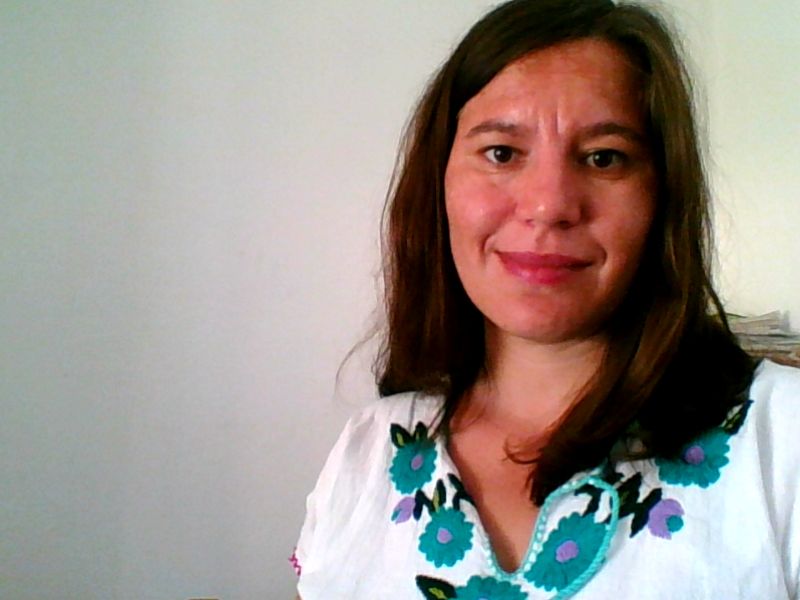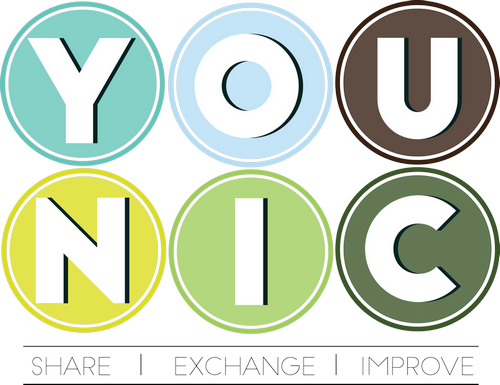Alexandra Dumitru
Romanian
EVS Volunteer in México
POST MOBILITY ARTICLE
Logistics Details
- accommodation: we lived with a local family which was culturally and personally a great advantage, we had separate rooms and intimacy when we need it but also a perfect shared space- an balcony with a great view; the rooms were basically furnished, we improvised and we tried to adapt as much as possible to what we received.
- transport: good flights connections; Isaias, the local coordinator accompanied me each time when I needed, when I arrived he came to the airport, also when I left he sent someone with a car, when I needed to solve the visa problem to Guatemala’s border, etc. a lot of “collectivos”, night buses, chicken buses, tuk-tuks, to travel.
- food: from Monday to Friday we used to eat in the family, Mexican dishes, during the weekends we received an amount of 250 pesos to eat outside; sometimes the family was inviting us to eat with them even if was not part of the agreement. Last two weeks I had an contradictory discussion with them, because we did not had access to the kitchen when they were not at home (at least twice a week, from 17h to 22h when they were going to the church) so I decided I to eat in town.
- visits: the first two months we visited some coffee fields, we met a small producer, we reached some communities around Motozintla in order to have an idea about social context and the natural beauty of the area, we met some key persons, representatives of the Culture House, the waste management coordinator, etc but we realized that we won’t have local authorities support. We noticed also the lack of participation to the project of the members of GAL, it would have been easier for us to have their support when we needed a small intervention of an electrician, or someone to help us the repair the roof of the terrace, things that we could not manage with the youngsters.
Tasks & Target Groups
The project itself was a continuously effort of automotivation, adaptation because we had to rethink the activities, we did not have the material resources and people’s proactivity. On the other hand, it is understandable their lack of participation because it is a new concept for them which will not bring extraordinary immediate benefits.
On the beginning a large number of youngsters frequented our activities by curiosity and attracted by the idea of the English diploma, the some renounced and we took it as a natural selection of those who are really interested to participate. When we interviewed face to face the candidates for the EVS, another part of the youngsters abandoned the project. The lasts gave up when we started to implement the idea of the social space, maybe because we increased the number working hours and we asked a personal involvement and more initiative of their part, but those who participated until we left are motivated to continue the project.
Acquired knowledge and tools (follow up projects, future implementation)
- the local NGO – first contact with EVS concept, different methods of working and organizing activities, a more transparent communication, first actions on youth sector in the community
- the group of youngsters – familiarized with the non-formal education, intercultural exchange experience, for the majority our meetings were a moment of self-reflection, questioning and self- awareness
- the most participative – increased initiative and confidence, easiness to express their ideas& creativity, better team-work, problem-solving attitude, understanding of the europeean volunteering model, a place to practice, develop and share their skills, knowledge, passions, an youth NGO to represent their interests
A positive aspect is that after our project ended up, the youngsters started the activities in the social space, they are organizing each Friday movie projections for the large public, they had some art workshops, one of them started to give English classes to a group of 20 children, they created together handcrafted logos with reused materials.
To make more effective the space, they would need:
- a better implication of the owner of the local, who agreed to finish the construction the bar table and shelves in order to sell basic products, to adapt the use of utilities and hygiene conditions such as access to water, a proper sink, etc
- to search alternative funding sources in order to finish to paint the furniture, create cushions, buy other materials, obtain internet access
- try to involve more youngsters
- on the long term, developing competencies on how to manage a small social business, fundraising, accountancy, public mobilization
Conclusions
As the project was for us, a once in a lifetime experience, also for those we met, it was richfull and even more in this case when we came from such different cultures. Not least, we have the satisfaction of creating together with youngsters the social space and we hope that the concept of having a collaborative space will be continued in their community.
MONTHLY ARTICLES
August 2017
We are getting out of the box
August was a very active month, I feel like somehow we settled a good connection with the group of young people and we started to have more activities outside the school where we are usually keeping our sessions. We tried to give more visibility to the project to the local community, we were on the radio and we held an informative workshop in a private university, we had also the chance to visit some nearby communities.
Together with Fanny, who is working with her association on women empowerment, we went in a community near Niquivil, to attend a short lesson on how to plant mushrooms in their own homes. Every time we reach isolated areas, I am amazed of the hospitality that people receive us in their homes and offer us the best; “el caldo de pollo de rancho”, tasty homemade tortillas grilled on the wood-burning stove. They have a sincere joy to meet you, the modesty and shyness of the simple and humble person. There is a Romanian writer who said that the eternity was born to the village and so it is. It seems like time stopped here.
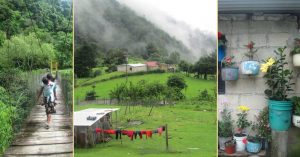
In our daily life, people are approaching us on the streets and ask who we are, what we do. If on the beginning, most of them thought we were big investors and they were asking us to export their products, now for sure, they know us as “güeritas” who are working with the young people in Motozintla. That’s how we arrived in the workshop of don’ Victor, a person who is reusing old tires, giving them another life and use. He saw an opportunity to work with all the useless wheels that are then abandoned on the sides of highways and turn them into unique furniture creations and decorations.
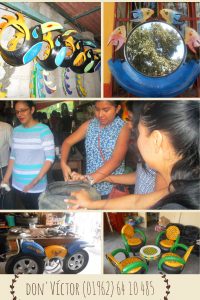
We went with the youngsters in his workshop not just to admire, but to learn a little bit from don Victor’s patience, passion and perseverance. It was a moment when we worked as a team and we realized that from the materials that we have around us, extraordinary things can be created.
This month, we went also to a reforestation action. The result? 600 planted pines and plenty of fun.
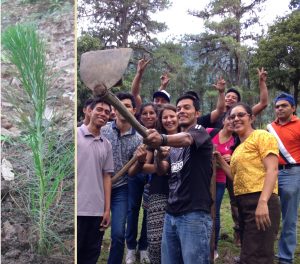
As an extension of the project with the youngsters, we do English classes with a small group of children and we are organizing workshops for developing social abilities to children during the summer school in the Cultural House of the city. That’s how we discovered that the House of Culture has a terrace which is not used. Many of the buildings have here a flat roof with large terraces, where people often dry their clothes, arrange small flower gardens, or just keep their watch dogs. We thought that the space could be converted into something great and and we presented the idea to the youngsters and they seemed quite motivated. It could be an urban garden, with seasonal vegetables and greens, to arrange a small organic market corner, or a meeting point where they can see friends, drink a coffee, talk, and organize events. We hope that soon we could start to work on this.
Also this month, an associate of the hosting organization invited us to the university where he is professor to have a small talk with his students. We took it as a good opportunity to have an exchange on the volunteering concepts, to explain our presence here and of course to launch an open invitation to participate in the project. As usual the organizational details are always a surprise, the starting hour is relative, the number of participants is approximately. When we arrived there, we had a group of 20 persons, and because there was an open work space, two other groups joined us, the teachers and finally the whole staff. The anecdote actually begins when Ruth, who was my second voice, but in Spanish, before the session, decided, it was the time to talk to the Mexicans on their mother tongue. All I can say is that my hands hurt at the end of the session and if I opened my mouth, it was sure to do a mix between all the Latin languages, less Spanish. It was the first time I spoke in front of a public in Spanish, and I was proud of it.
The last week we took advantage of the fact that we live nearby the border of the state and with the others volunteers, Tania, Valentina and Ruth we went on an exploring trip in Guatemala. It was an entire adventure, we travelled in chicken buses because it was cheaper – a party on wheels with extreme stops and starts. Stepping on a bus you enter the real Guatemala. The noise, the music, the smell and the overwhelming mass of color is Guatemala at its best.

The adventure continued coming back to Mexico, I had to enter in the country without visa and live an adrenaline week-end as an illegal immigrant because apparently as Romanian I had to pass an detailed interview, but the responsible officer begun the week-end earlier that Friday, so I returned Monday morning with Isaias, the local coordinator of the project, and the officer was on an important meeting, so we went for a shopping session in market somewhere between the border of two countries, I even bought a second hand dress and we returned later. After other two hours of waiting in vain in an empty hall, the officer saw that we were not there to give up, so he just put the magnificent stamp, without any other questions. No further comments.
July 2017
The project starts to take shape
We dedicated most of our energy to organize sessions of non-formal education with the two groups of youngsters, in order to get to know each other better, to create a confidence climate where they could express freely and to experience with them new tools and methods to further develop skills and attitudes.
It was a surprise for us, that, even the majority come from Motozintla, a relative small city, most of all didn’t knew each other before, they studied in the same schools, are frequenting same places, have common friends but they didn’t have a space or just the chance to speak, before. Also there were people coming from surrounding communities. There is not an average age; we have teenagers of 14 years old, also adults with families, each one with a different background and experience, some are still studying, some of them didn’t pursued a career, some are engineers, teachers, or working in small family businesses and some are just tired of having nothing to occupy their time. Challenging? Yes, furthermore I had no previous experience as a trainer and with my colleague Ruth, and we passed all the mornings researching icebreakings, brainstorming on each game, trying to put ourselves in their skin and understand their behavior, their ideas. All the effort was duplicated because I was still speaking in English 90% of the time. At the beginning, we were very methodically, we were writing each activity description with objectives, the allowed time and commentaries, after some weeks we started to listen more to the group reactions, to observe each person evolution, to adapt easier and just to be more natural in our interaction.

Of course, it was something new also for them, they were expecting to receive formal English classes, we tried to introduce some vocabulary, but it was impossible obtain visible results in less than 6 months, and it would have been a waste of time continuing. It was surprising for them to experience non-formal education; it was like gathering adults in a school class to play infantile games for three hours, they were shy and reserved, but they were curious, and started to participate more in the activities and to have fun together. We touched a wide range of subjects and competencies such as intercultural awareness, problem solving skills, teamwork, self-confidence, using self-reflection techniques, practical group activities, debates, public speaking, forum theatre etc.
One of the most interesting sessions, I think it was the one when we talked about stereotypes & prejudices and we used the method of “the label on the forehead”. Without knowing what is written on their post-its, they had to find pairs, people they would like to have around, to change ideas with others and then to try to guess what stereotype they think they were wearing. Among the etiquettes we had indigenous, gringo, atheist, homosexual, macho man, drug dealer, easy women. The experiment was great parallel with the real life and the youngsters confessed us they passed thorough en entire palette of emotions, from feeling uncomfortable, marginalized, and frustrated to acceptance, appreciation depending on the qualities or the weaknesses attributed to them during the game.
The most pleasant moment of the day is on the last 15 minutes when we are together with the youngsters, we are debriefing the sessions, talking about our feelings, about the meaning of each activity, it is an utterly simple moment, but always enjoyable.

With Ruth, we are ending the day on our chill-out corner, the balcony of the house – Silvia, our host, call it a deposit for all the garbage we could gather from the streets, but those are precious materials to create decorations. We are speaking uncounted hours about everything and nothing, watching the stars, drinking our Indios in teacups – a local beer that we buy just to complete our etiquettes collection. For the cloudy nights, when there were no stars, we invented our own constellation formed by the lights of hill houses.
This month I had my 28th anniversary, and definitively I feel like there is no other place in the world where I would rather be. Right here, right now…
June 2017
My first month in Mexico was a period of continuously adaptation to the local reality, a period of overpassing cultural differences, interrogations and answers, a time to discover Chiapas as it is: colourful, with generous and warm people, with youngsters with beautiful ideas, bustling street merchants, delicious fruits, roads with a million speed bumps, exquisite colonial architecture, a stress free daily life, cold water showers, breath-taking landscapes, welcoming indigenous communities, earthquakes, chilli with everything…Chu-laaaa-da!
The perception of the time here is quite different; the most common expressions related to time are “ahorita”and “al ratito”. Ahorita could mean in five minutes as one week and al ratito could mean never ever, so just imagine when you have to wait someone. Another special aspect of counting hours here, is that there are places where the “summer schedule” changed with one hour and places when it didn´t change, sometimes even the mobile clock is making its updates but you never know the hour exactly. After a month I stopped trying to interpret their way of perceiving time and I am just going with the flow.
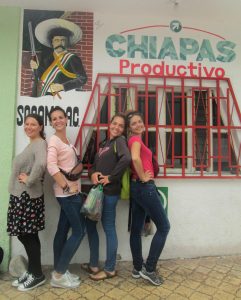
I wake up each day with the sound of the commercial trucks passing under my window; I recognize all in function of their nice jingles played on maximum volume on megaphones. At 7 30´ in the morning passes slowly the gas car, then different water brands such as “aguaaa acceeeeeeess, excesivamente pura”,”agua nikibil” and just after, the garbage truck with its bells, this last one passes at least two, three times to be sure that everyone has waken up to deposit their trash. During the day, there are also the person, who is selling pineapple, repeating “piña dulce, piña fresca”, the men selling tamales, and many others. One day even the drunken of the quarter delighted us a good moment with serenades under the balcony. I could not imagine a day without them.
I work with Ruth de España :D, even if I know her from some weeks, I feel like this is the beginning of the beautiful friendship. She helped me a lot with the translations. I publicly confess that she is like a walking dictionary and a medium for me because she often translates what I think but I can not express it in Spanish. Together we live in a Mexican family; we have large individual rooms, access to all the facilities, an excellent view on our windows, a place to call it home. Living like the locals is probably one of the best parts of this experience- Silvia fulltime mother of four children and her husband, teacher in a colony near Motozintla are treating us as part of the family, they pay attention to our needs and try to involve us in their plans as much as possible. We pass with them a lot of cheerful and quality moments, we are often talking until midnight, they are curious about our way of thinking, living, doing things, they share their ideas and they are always respectful to the cultural differences. The grandmother of the family prepares the best hot chocolate I have ever tasted and she has a homemade cure for every health problem.
The initials steps of the implementation of the project in Motozintla were difficult; this is the first time when a similar project lands here and we had to rethink what type of activities were realistic. We were expected to do give 6 hours per day English classes and/on the topic of recycling to children, taking time of their school programme and to deliver language certificates in 6 months to youngsters, or this was not adapted to the local needs and faraway from the objective of the project: empowering youngsters in order to become agents of change in their community, to develop social and entrepreneurial skills. Finally we decided to work with o around 35 youngsters trough dynamics and non-formal education in order to create a motivated group for future projects, and the objective is half-achieved. One of the first projects we started together is to create a social space specially dedicated to the youngsters of Motozintla, on the terrace of the Cultural Centre of the city. We already cleaned the space and we wanted to realize all the furniture with reused materials, ready, steady, go! Furthermore we are organising also activities with children on social skills developing, basic English vocabulary and educative games. They are adorable, a source of unfinished energy and they are eager to learn each time new things.
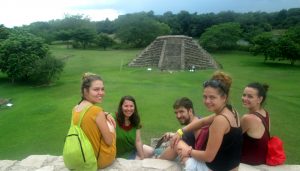
Isaias, the director of our hosting organization the Local Group of Action Mamkach (GAL) was opened to our proposals and he is supporting us with all that is necessary and even more. Adin, another member of GAL is providing us full speed internet and the best coffee from Chiapas each morning. Eve from Agroem shown us a totally different world of some isolated colonies surrounding Motozintla. Fany from Agromujeres facilitates us meetings with groups of inspiring women willing to improve their life, their families’s life, their role in the community. I could speak also about the other half of Younic project Valentina (Italy) and Tania (Spain) who are resisting like heroes in the freezing Porvenir, the old man of the “abarrote” which sells us the Emperador cookies on the road to the office, the lady from the market who prepare “el atolito de cacahuate”, and many others who are making our staying here so special.
PRE-DEPARTURE ARTICLE
Challenge accepted!
Hi! My name is Alexandra, I am from Romania and I am part of YOUNIC project, probably one of the best decisions I have made so far. Deciding to leave everything what I have and take a deep plunge into a foreign country with a different culture and a language that I barely understand it is definitely out of my comfort zone, but I seized the opportunity full of curiosity and enthusiasm and I am sure this will be a once in a lifetime experience.
